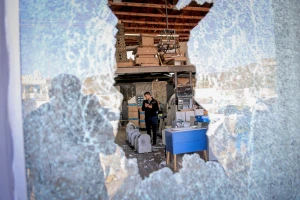‘Don’t ask, don’t tell’ aliyah: All different kinds of Jews are welcome in Israel

It was back in 1994 when then-US president Bill Clinton enacted the “Don’t ask, don’t tell” policy, allowing for military recruits to not openly disclose their sexual orientation, a revelation that would have otherwise precluded them from serving in the military.
Today, this same policy could save Diaspora Jews, who have begun to feel as if their countries are no longer safe. As many consider a move to the Jewish homeland, Israel must prepare to receive their sons and daughters “as they are,” rather than as the people whom they would like them to be.
At a time when we are witnessing the worst wave of global antisemitism since the Holocaust, even affecting both totally assimilated, non-observant Jews, there is an unacceptable and antagonistic attitude present in Israel’s Interior Ministry, discriminating against Jews who are not connected to the faith or even their community.
Relevant during persecution
But is that relevant at a time when they are being persecuted just because of their shared ethnicity? Every Jew, regardless of their personal beliefs or orientation, should be guaranteed a safe refuge in the State of Israel. Nevertheless, that is not necessarily the case.
Upon applying for citizenship, whether through the Jewish Agency abroad or here in Israel, there is an immediate demand for an official letter to be presented from a rabbi who can speak on behalf of the individual applying for citizenship, guaranteeing that this person is a Jew in good standing. But is there really such a thing?
A Jew is a Jew, simply because they were born that way. Under the 1950 Law of Return, eligibility for citizenship is extended even to those who only have one Jewish grandparent. So why should personal beliefs or lack of synagogue affiliation be divulged as if entrance to one’s ancestral homeland is dependent upon those things?
Judging Jews
For now, the Interior Ministry is operating on the orders of the ultra-Orthodox segment of the country’s religious and political leaders, whose policy is to deny citizenship to those they deem to be “undeserving Jews.”
They include those who are assimilated, intermarried, unable to provide the requisite rabbinical letter due to having no synagogue affiliation, or those who may believe in another faith. Nonetheless, their ethnicity is unchangeable.
In America alone, that number is likely to be in the hundreds of thousands, if not more. Will Israel abandon them, leaving them to face threats and persecution already happening? If so, how could Israel claim moral superiority to those countries that turned away boatloads of Jews fleeing Nazi Europe?
Leaving them to languish in hostile communities is not, in any way, consistent with Jewish values of saving lives at all costs – even to the point of breaking Shabbat.
No acid test
The reality is that most Jews don’t identify with the Orthodox or think like them, but should the Interior Ministry arbitrarily disqualify them as Jews?
Religious observance or synagogue affiliation cannot be the acid test of who is a Jew, and that is why a “Don’t ask, don’t tell” aliyah policy should be adopted. If a Jew can produce documents showing at least one Jewish grandparent, automatic citizenship should be granted, just as the law states.
Let’s not forget that secular, native-born Israelis, who are mostly unobservant, are never questioned about their right to be here, so why single out those who were born abroad? Yet, many have been turned away and sent back home when bureaucrats doubted their commitment to Judaism.
This antiquated and prejudicial immigration practice must be changed because the world has changed.
There should be no prying into private areas of prospective immigrants if they can provide proof of Jewish ethnicity by birth.
Anything else is an invasion of privacy and a deliberate roadblock to accessing a safe refuge during the scariest moment for Jews in more than 80 years.
NYC: Most Jews' home
The recent victory of a radical Muslim mayor in New York, home to more Jews than any other in the world, including Jerusalem or Tel Aviv, has to be considered a frightening harbinger of what’s coming. When he cannot denounce the deadly phrase, “Globalize the Intifada,” or threatens to arrest Israel’s prime minister, should he step foot in New York, that’s a bad sign for Jews.
How long will it be before he completely disenfranchises all Jews doing business with Israel, either directly or indirectly? Where will they go when he puts an end to their livelihood? And let’s not kid ourselves – he’s not the only one of his type. Other American and European cities are seeing an upsurge of Muslims coming into power. Will they follow suit and also discriminate against Jews?
You don’t have to dress like an observant Jew in order to be vulnerable to attack. Just enter a Jewish institution or event, and your risk rises significantly.
Israel was never on their radar
With the influx of millions of illegals, many of whom are Muslim terrorists whose goal is to wreak havoc in Western communities, a non-observant Jew just might feel that living in Israel, where the military is committed solely to the safety of Jews, is something that is appealing at this moment in time.
And while they may not be seeking to immigrate for the reasons many have – to connect more closely to their people, their faith or the land, those things will inevitably result, because it’s unavoidable. They will come to realize that life in Israel is so much more fulfilling and meaningful.
Confronted with the incomparable experiences of Friday night family dinners, lighting Shabbat candles and joining their fellow countrymen in ushering a real day of rest, these things will only serve to deepen their Jewish identity, not further alienate them.
Israel was never on their radar because no one ever thought that Jews would, yet again, be faced with the unjustified hostility experienced by their relatives who are already several generations removed from them.
Their mistake was settling in and taking for granted that those toxic sentiments would not emerge in their lifetime. Now that they have, we cannot be indifferent to their situation.
They have a refuge – if only the gatekeepers will let them in. That can only happen with a “Don’t ask, don’t tell” policy, because no one needs to know anything beyond their bloodline. Turning them away is not who we are, nor whom we should ever be!
This article originally on appeared on The Jerusalem Post and is reposted with permission.

A former Jerusalem elementary and middle-school principal who made Aliyah in 1993 and became a member of Kibbutz Reim but now lives in the center of the country with her husband. She is the author of Mistake-Proof Parenting, based on the principles from the book of Proverbs - available on Amazon.
You might also like to read this:











